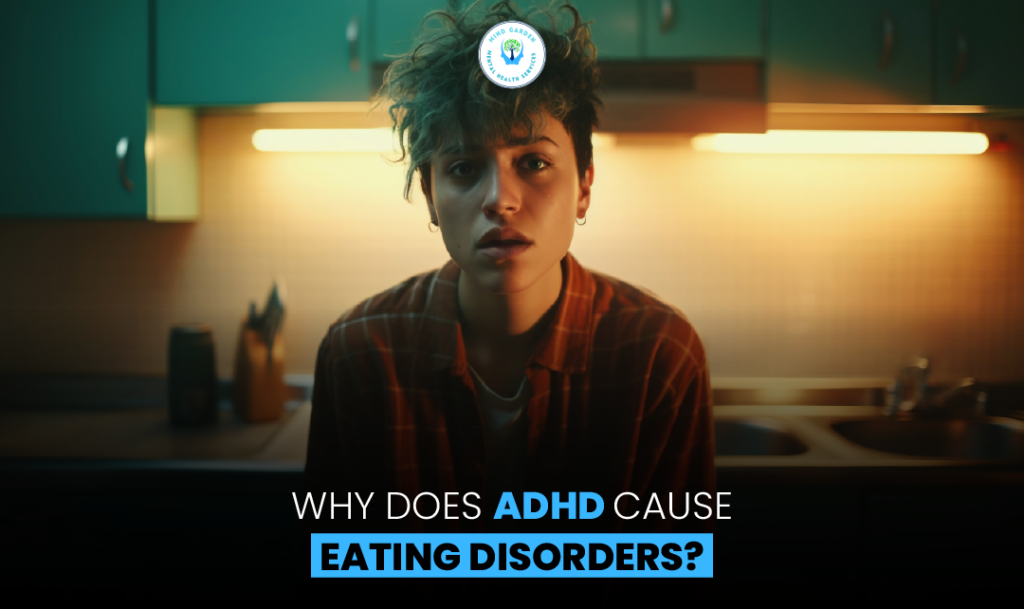
A lot of people know about the lack of focus and hyperactive tendencies linked with Attention Deficit Hyperactivity Disorder (ADHD).
However, not everyone understands that ADHD and eating disorders often go hand-in-hand. This combination can create challenging situations for those affected.
With this blog, we aim to explain why ADHD might pave the way for eating disorders, taking a closer look at the connections between these conditions and their effects.
What is ADHD?
ADHD is a common issue that impacts the skills of people to handle time, focus, and control impulsive behaviors. No two ADHD experiences are the same, as symptoms vary.
Impulsivity and Decision-Making
Being impulsive is a critical ADHD trait that can influence food-related decisions heavily. Those with ADHD may find it hard to control strong desires or think about the impacts of their eating routines. This impulsive action can trigger eating habits connected to problems like binge eating.
Emotional Dysregulation
People with ADHD often deal with emotional dysregulation. They might respond to situations more emotionally intense than their counterparts. Food can become a resort to tackle strong emotions, leading to disordered eating.
Why Does ADHD Cause Eating Disorders? – The Possible Link
ADHD and eating disorders are tangled and influenced by multiple mental and physical elements.
Dopamine and Reward System
Dopamine, the reward system, is linked to both ADHD and several eating disorders like binge eating disorder (BED) and bulimia.
Those with ADHD may crave rewarding things to increase dopamine levels. Eating, particularly sweet and fatty foods, can be one such thing.
Lack of Structure and Routine
Maintaining a routine can be tough with ADHD, especially when it comes to regular meals. The lack of routine can push people towards irregular eating habits, like skipping meals and then overeating, classic signs of eating disorders.
ADHD and Body Dysmorphia
ADHD and body dysmorphia are connected as well. Some individuals with ADHD may grow a body image obsession.
Their fixation on imagined body imperfections can mingle with ADHD’s impulsiveness and emotional burdens, leading to disordered eating to cope with these feelings.
ADHD and Picky Eating
ADHD often pairs with picky eating habits. This results from sensitivities to certain textures or tastes, causing a restrictive diet. Over time, this can lead to unhealthy eating patterns.
ADHD and Food Sensitivities
Additionally, ADHD can increase sensitivity to particular foods.
This may result in avoiding certain foods and sticking to those deemed ‘safe,’ causing a dietary imbalance.
Specific Eating Disorders Linked to ADHD
ADHD can be related to various eating disorders, with some more commonly associated than others.
Binge Eating Disorder (BED)
Binge Eating Disorder (BED) is common among people with ADHD. Impulsive behavior and emotional instability from ADHD may cause bouts of rapid food intake, often leading to guilt.
Bulimia Nervosa
Bulimia includes patterns of bingeing and purging. The impulsiveness and emotional issues from ADHD can fuel these activities, resulting in hasty eating and attempts at compensating through purging.
Anorexia Nervosa
Although uncommon, some people with ADHD might develop Anorexia. A hyper-focus on body image or controlling food intake could be an approach to handle ADHD symptoms.
How to Manage ADHD and Eating Disorders
If you’re managing ADHD and associated eating disorders, a holistic approach is key.
Behavioral Therapy
Using Cognitive Behavioral Therapy (CBT) is one method. It’s great at tackling ADHD as well as eating disorders. This therapy lets people learn good eating habits and strategies to control ADHD.
Medication
Medication can also play a major role in treatment. With ADHD, doctors often suggest stimulants and non-stimulants. For eating disorders, separate meds are on offer. A mental health pro can help pick the perfect combo.
Nutrition Counseling
Additionally, a dietitian knowledgeable about ADHD can help design a balanced food plan. This kind of plan matches one’s lifestyle and fosters a healthier attitude towards food.
Building Awareness and Support
Knowing the bond between ADHD and eating disorders is important for the right backup. This knowledge can make sure we make the best diagnosis and treatment selection and get good results.
Family and Community Support
Let’s remember family support, too. Getting relatives involved can give much-needed understanding. In addition, using community resources and support circles can be useful.
Takeaway
ADHD and eating disorders are closely linked, which calls for an all-encompassing approach to help and care. By focusing on the special hurdles that ADHD folks face, we can aid them in fostering healthier food habits and enhancing life quality.
Taking the Next Steps
If you or a family member is grappling with ADHD and eating disorders, think about connecting with Mind Garden.
Our caring team of pros extends custom-fit care and help meet your needs. Embark on a journey toward a better tomorrow by getting in touch with us today.
References
- ADHD and eating disorders in childhood and adolescence: An updated minireview. Journal of Affective Disorders, 321, 265-271. https://doi.org/10.1016/j.jad.2022.10.016
- The association between ADHD and eating disorders/pathology in adolescents: A systematic review. Open Journal of Epidemiology, 3, 193-202. https://doi.org/10.4236/ojepi.2013.34028
FAQs
Can ADHD cause disordered eating?
Yes, it may cause disordered eating habits.
Why is it hard to eat with ADHD?
Meal planning and eating can be hard due to constant distractions and impulsive behaviors.
Why do you forget to eat with ADHD?
Challenges with organizing time and setting priorities can result in missed meals.
Why does ADHD cause picky eating?
People with ADHD might have specific taste preferences and sensory issues, leading to selective eating.
Why do people with ADHD skip meals?
They may skip meals due to impulsive actions and concentration issues.
Does hunger make ADHD worse?
Yes, hunger can heighten symptoms like difficulty focusing and irritability.
